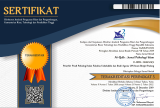Phenomenology: Meaning and Benefits of Salat Tahajud in Early, Middle, and Late Adult Women
Abstract
Keywords
Full Text:
PDF (Bahasa Indonesia)References
Al-Firdaus, A. (2015). Banjir kemuliaan dengan shalat tahajud. Qultum Media.
Al-Kamal, S. M. A. (2007). Mukjizat Shalat Malam. Mizan Pustaka
Allahverdipour, H., Karimzadeh, Z., Alizadeh, N., Asghari Jafarabadi, M., & Javadivala, Z. (2021). Psychological well-being and happiness among middle-aged women: a cross-sectional study. Health care for women international, 42(1), 28-42. https://doi.org/10.1080/07399332.2019.1703990
Al-Quran. (2022). Litequran.net: Baca Al Quran Online. Retrieved from https://litequran.net/ (Accessed 26 December 2021).
Al-Sya‘rawi, S. M. (2010). Tirulah Shalat Nabi: Jangan Asal Shalat. Mizania.
Arifin, S. (2018). Pendidikan Agama Islam. Deepublish.
Astutik, S. A., & Hasibuan, W. F. (2018). PENYEBAB WANITA KARIR DEWASA MADYA TERLAMBAT MENIKAH. KOPASTA: Journal of the Counseling Guidance Study Program, 5(1). https://doi.org/10.33373/kop.v5i1.1445
Bafadhol, I. (2017). Pendidikan Akhlak Dalam Perspektif Islam. Edukasi Islami: Jurnal Pendidikan Islam, 6(02), 19. http://dx.doi.org/10.30868/ei.v6i12.178
Chen, Y., Peng, Y., Xu, H., & O’Brien, W. H. (2018). Age differences in stress and coping: Problem-focused strategies mediate the relationship between age and positive affect. The International Journal of Aging and Human Development, 86(4), 347-363. https://doi.org/10.1177/0091415017720890
Dickens, L. R. (2017). Using gratitude to promote positive change: A series of meta-analyses investigating the effectiveness of gratitude interventions. Basic and Applied Social Psychology, 39(4), 193-208. https://doi.org/10.1080/01973533.2017.1323638
Irawati, D., Natsir, N. F., & Haryanti, E. (2021). Positivisme, Pospositivisme, Teori Kritis, dan Konstruktivisme dalam Perspektif “Epistemologi Islam”. JIIP-Jurnal Ilmiah Ilmu Pendidikan, 4(8), 870-880. https://doi.org/10.54371/jiip.v4i8.358
Irwan, I., Perdana, F. W., Latuheru, P. M., Khairani, M., & Kartini, S. (2021). Pemikiran Tokoh Pakar Hukum Lima Paradigma. Jurnal Indonesia Sosial Sains, 2(12), 2166-2178. https://doi.org/10.36418/jiss.v2i12.497
Jannah, F. M., & Zuhriyah, N. A. (2018). Tugas Dan Faktor Perkembangan. Tugas Dan Faktor Perkembangan, 1-13. http://eprints.umsida.ac.id/id/eprint/1275
Kasan, H., Mustafa, M. F., Haimi, S. S., & Faruk, U. (2017). [Interaction Factors with Al-Quran in The Appreciation Process of Students’ Religious Lives in Ukm] Faktor Interaksi dengan al-Quran dalam Proses Penghayatan Kehidupan Beragama Pelajar-Pelajar UKM. Jurnal Islam dan Masyarakat Kontemporari, 15(1), 84-93. https://doi.org/10.37231/jimk.2017.15.1.224
Lenaini, I. (2021). TEKNIK PENGAMBILAN SAMPEL PURPOSIVE DAN SNOWBALL SAMPLING. Historis: Jurnal Kajian, Penelitian dan Pengembangan Pendidikan Sejarah, 6(1), 33-39. https://doi.org/10.31764/historis.v6i1.4075
Maryam, S. (2018). Shalat Dalam Perspektif Imam Al-Ghazali (Kajian Sufistik). AL-FIKRAH: Jurnal Studi Ilmu Pendidikan dan Keislaman, 1(2), 106-113. https://jurnal.alhamidiyah.ac.id/index.php/al-fikrah/article/view/38
Olson, R., Knepple Carney, A., & Hicks Patrick, J. (2019). Associations between gratitude and spirituality: An experience sampling approach. Psychology of Religion and Spirituality, 11(4), 449. https://doi.org/10.1037/rel0000164
Putri, A. F. (2019). Pentingnya orang dewasa awal menyelesaikan tugas perkembangannya. SCHOULID: Indonesian Journal of School Counseling, 3(2), 35-40. https://doi.org/10.23916/08430011
Sholeh, M. (2006). Terapi Shalat Tahajud: Menyembuhkan Berbagai Penyakit. Noura Books.
Siregar, M. N. (2019). Hadis tentang Keimanan Orang yang Berbuat Maksiat. SHAHIH (Jurnal Kewahyuan Islam), 2(1). http://dx.doi.org/10.51900/shahih.v2i1.4018
Syufiyah, S., & Rasmanah, M. (2018). KORELASI INTENSITAS MENGIKUTI SHALAT TAHAJUD BERJAMAAH DENGAN SELF CONTROL SANTRIWATI DI PONDOK PESANTREN MODERN TARBIYATUL MUBTADI’IN TANGERANG. Ghaidan: Jurnal Bimbingan Konseling Islam dan Kemasyarakatan, 2(2), 29-47. http://jurnal.radenfatah.ac.id/index.php/ghaidan/article/view/2946
Yusanto, Y. (2020). Ragam Pendekatan Penelitian Kualitatif. Journal of Scientific Communication (Jsc), 1(1). http://dx.doi.org/10.31506/jsc.v1i1.7764
Refbacks
- There are currently no refbacks.
Ruang Jurnal,
Fakultas Ushuluddin dan Studi Agama,
UIN Imam Bonjol Padang
Jl. Mahmud Yunus No.6,Lubuk Lintah,
Kota Padang, Sumatra Barat
E-mail: jurnal-alqalb@uinib.ac.id

This work is licensed under a Creative Commons Attribution-ShareAlike 4.0 International License.



